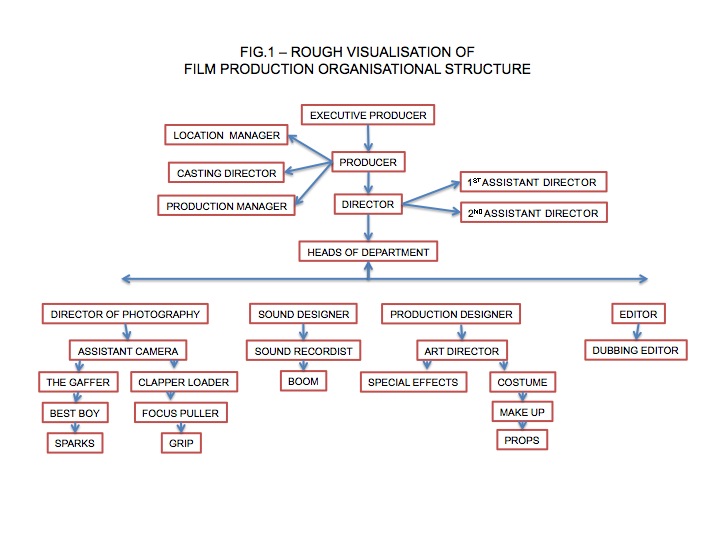
I read a very disturbing blog on the film industry a few days ago by James Fair (lecturer in Film Technology at Staffordshire University).The thing that made me sick was the site of a corporatist organizational chart. If you're anything like me, the site of these charts makes you want to puke (You may want to put your hand over it).
So here we have a film scholar (as if good filmmaking was ever a scholarly endeavor) telling us that business models are questionable in light of the artistic and creative aspects of filmmaking. Then he goes on to suggest there may be a better model out there, even though this one is working. But the current system isn't working. It never did work. The film industry is having one of its greatest depressions. Even when it was on top, 50% of all industry product never made a profit.
The problem is not that we need a better business model. The problem is that even having a conversation about a business model is absurd, which brings me to David Lynch. When I listen to him talk about the process of making a film, there is no business model or organizational structure. You may say even he has departments run by department heads, which may be true. But in a truly harmonious film production these departments operate as single entities to fulfill their respective tasks, and like our scholar mentions, none of this is ever set in stone.
The problem that 99% of the film industry continues to have is that film is not a business, nor is it purely an art. It's the business of making art, and that means that the art has to come before the business, since you can't sell your art if you don't go about making it first. This may depend on your definition of "art", which is an abstract word much like love. I think of art as stuff that moves people emotionally and even physically. That has absolutely nothing to do with making money in itself. If the moving of people can be achieved then I think the money making potential is there. You don't start out with the idea of having to make money and then come up with art that has that goal. That is not art. Nor should business have as its goal to make money without first having some higher purpose, to fill a need or fix a problem or help society.
Of course, failed American corporatism and its decades of authoritarian conservative ingrained tradition will continue to insist to its dying day that pure business models (regardless of product and with no other goal than money) are the way to go about doing any business, even art. But, like the Roman Empire, blind leading the blind (no one knows anything in Hollywood) kind of thinking is ultimate doom.
Pull out David Lynch's Inland Empire DVD. You do have one right? There, not only will you find David Lynch show you a great quinoa recipe (maybe you eat too much meat to be able to make good films that can sell on their own merit) but you'll also hear him talk about his artistic "business model", which amounts to getting one idea, then getting another idea, and eventually putting these ideas together. But if you were to talk to a good sample of great artists, you'd find that each of them have different ways of doing their art.
Even most indie filmmakers have a model where they come up with a script, and even a cast an crew, and sometimes even make the film before they go about looking for an "executive producer" (since often the only real business aspect of films is the distribution after they're made). They may or may not take notes from that producer. My understanding is that most indie producers act as patrons and seek to fund artists with no expectation of return. That is the traditional model of artistic endeavor around the world.
The one reason that any good films even exist in America, I think, is that there are indie renegades out their like David Lynch and there is also the independent spec screenwriter factor. Screenwriting can be done in a vacuum away from all the failed corporatist bullshit. So in that regard, screenwriters have the ability to be true artists, going about writing in whatever artistic way suits them (as George Lucas did far away from Hollywood). For that reason, we have some great screenplays in existence that Hollywood then gets it's greedy clammy little hands on and plugs into its organizational chart to end up with something resembling art (so long as no dogs are killed).
Another fallacy about the chart above, with the quintessential executive asshole at the top, is that there is no marketing department. Anyone and everyone knows that in the Hollywood studio system marketing is god. They only make films that project (as proven under failed corporatist business formulas) to make money. So we end up with trilogies and sequel after sequel riding on the success of previous success. We see film stories (like Inception) ripped off of other films (like The Matrix) that worked and we see a plethora of remakes that are again remade on a regular ten year schedule, just like regular old white men on Exlax.
Fuck all that.
